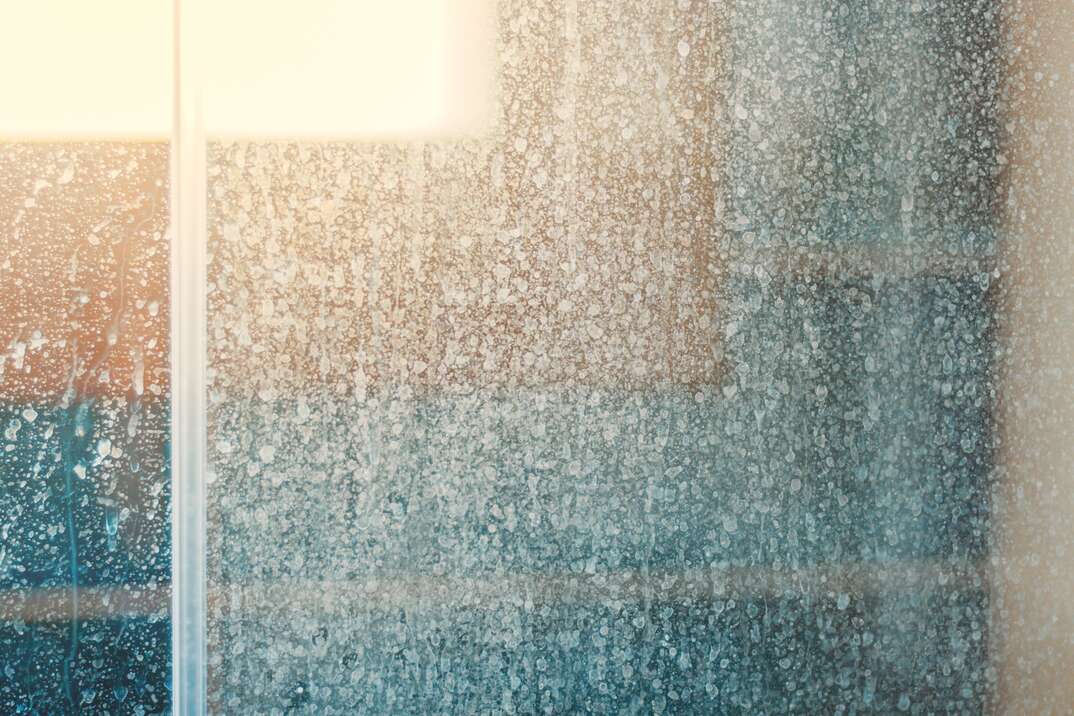How to Clean Hard Water Stains

While hard water doesn’t necessarily pose a health risk, it can still cause problems. In particular, it can leave stains anywhere you use water.
Chalky residue, soap scum, or a film or crust around the sink or in the shower are common. Thankfully, it’s possible to get rid of hard water stains.
What Causes Hard Water Stains?
Hard water contains high levels of minerals, especially calcium and magnesium. When the water evaporates, the minerals are left behind, leaving stains on surfaces. The problem is often worse when water is boiled. Heating the minerals in the water can cause calcium carbonate to form. These are the deposits you often see in a coffee maker, but they can be found anywhere there's hot tap water.
You’re more likely to find soap scum in your bathroom. Hard water makes it hard for soap to form a lather because the minerals bind to the sodium it contains. It forms the filmy, off-white soap scum that sticks to surfaces like tiles, baths and basins. Soap scum can't be dissolved in water, making it hard to clean and a good breeding ground for mold and mildew.
There are different ways to get rid of hard water stains, mostly using household substances that are easy to find.
Avoid the Stains
The easiest way to remove hard water stains is to clean them before they form. As hard water dries, it leaves white spots on most surfaces, from sinks to counters and your home’s exterior. Wipe up any spills or splashes before they can dry, and you won’t get water stains. Keep a squeegee in the shower to wipe away moisture to stop your shower screen from becoming cloudy. Alternatively, a water softener can stop the problem at the source by removing the minerals before water comes out of the tap.
Vinegar Spray
Vinegar spray works on most surfaces where you experience hard water stains. The acidic vinegar dissolves the minerals. You’ll need water, white vinegar and a spray bottle for this solution.
1. Mix equal parts water and vinegar.
2. Spray onto the stain.
3. Wait 15 minutes to let the vinegar break down the minerals.
4. Gently wipe away with a small brush or scrub pad.
If it’s not working, you can try increasing the ratio of vinegar to water.
Other Ways to Use Vinegar
Try this option for hard-to-reach places, such as around sink knobs or in the corners of your bathroom. You need white vinegar, water and rags or paper towels.
1. Mix equal parts vinegar and water in a bowl.
2. Soak the paper towels or rags in the mixture.
3. Wring out excess liquid.
4. Set the towels on the stain or wrap around awkward spaces.
5. Leave for 15 minutes.
6. Wipe away.
7. Lightly scrub if needed.
You can use this option for a blocked shower head by tying the soaked rag around it.
Baking Soda Paste
Baking soda paste is a good choice for bathtubs, tiles and sinks. These surfaces don’t need to be treated as carefully, and the paste sticks to vertical surfaces. You need a bowl, baking soda and a mixing utensil.
1. Put 1/3 cup of baking soda in the bowl.
2. Slowly add water and mix until a paste forms.
3. Make sure it's thick enough to stick to surfaces without sliding down.
4. Apply to the stain and let sit for at least 15 minutes.
5. Thoroughly rinse away.
6. Lightly scrub if needed.
Hydrogen Peroxide & Baking Powder
Hydrogen peroxide has bleaching effects, so don’t leave it for too long. Baking powder, which is cream of tartar mixed with baking soda, is a mild abrasive. That makes this mixture good for stubborn stains on surfaces that aren’t too delicate. You need a bowl, hydrogen peroxide and baking powder.
1. Mix hydrogen peroxide and baking powder into a runny paste.
2. Apply to stain.
3. Let sit for up to 30 minutes, depending on the stain and surface.
4. Rub away with a damp sponge.
More Related Articles:
- Calling a Plumber? Here Are the 6 Most Common Plumbing Jobs and How Much They Cost
- 6 Ways to Try to Unclog Your Sink Before You Call a Plumber
- What's in My Plumber's Van?
- Here's How Much It Costs to Remodel a Bathroom
- 6 Tips for Hiring a Plumber
Fluoride Toothpaste
Fluoride toothpaste can also clean away mineral stains. It works best on metal fixtures and glass surfaces.
1. Rub the toothpaste onto the stain.
2. Leave for 5 minutes.
3. Scrub gently with a damp brush or sponge.
4. Wipe all the residue away and let dry.
Dish Soap
Because soap can react with hard water to cause stains, using dish soap to clean them may seem like a bad idea. However, it’s a good choice for surfaces such as granite and marble that are easy to damage with acidic cleaners. You need a spray bottle, dish soap, distilled water and a toothbrush or non-scratch sponge.
1. Mix a few drops of dish soap with warm distilled water.
2. Spray onto the stain.
3. Let sit for a few minutes.
4. Gently scrub with the toothbrush or sponge.
It’s likely you’ll need to do more scrubbing with this solution, but be careful not to damage your counters.
Elocal Editorial Content is for educational and entertainment purposes only. Editorial Content should not be used as a substitute for advice from a licensed professional in your state reviewing your issue. Systems, equipment, issues and circumstances vary. Follow the manufacturer's safety precautions. The opinions, beliefs and viewpoints expressed by the eLocal Editorial Team and other third-party content providers do not necessarily reflect the opinions, beliefs and viewpoints of eLocal or its affiliate companies. Use of the Blog is subject to the
Website Terms and Conditions.The eLocal Editorial Team operates independently of eLocal USA's marketing and sales decisions.



